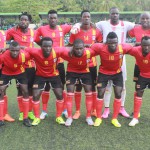Uganda has been elected Vice President of the Conference of Parties to the Convention on Migratory Species of Wildlife (CMS) with Dr Barirega Akankwasah Acting Commissioner for Wildlife Conservation in Ministry of Tourism Wildlife and Antiquities taking up the Vice President’s seat.
As Vice President, Dr. Akankwasah will deputise the Minister of Environment, Forestry and Climate Change of India, Prakash Javadekar. Dr. Akankwasah will also chair the Committee of the Whole for the Conference of Parties which clears all business for consideration by the plenary of the Conference. Uganda will hold the position for the next three years.
Speaking at the sidelines of the conference after his elections. Dr. Akankwasah acknowledged the contribution of Uganda’s success in conservation.
“International recognition of Uganda to steer global UN frameworks is a vote of confidence in the conservation efforts Uganda has had. It is the conservation actors both state and non-state that have made my election happen. I owe this to my motherland Uganda.” He said
CMS is an international agreement between governments that provides a global platform for the conservation and sustainable use of migratory animals and their habitats. The body brings together the States through which migratory animals pass, the Range States, and lays the legal foundation for internationally coordinated conservation measures throughout a migratory range.
It was adopted in 1979 and entered into force on 1st November 1983. CMS, also known as the Bonn Convention, recognizes that states must be the protectors of migratory species that live within or pass through their national jurisdictions and aims to conserve terrestrial, marine, and avian migratory species throughout their ranges.
Migratory species threatened with extinction are listed on Appendix I of the Convention. CMS Parties strive towards strictly protecting these animals, conserving or restoring the places where they live, mitigating obstacles to migration and controlling other factors that might endanger them. Besides establishing obligations for each State joining the Convention, CMS promotes concerted action among the Range States of many of these species.
In this respect, CMS acts as a framework Convention. The agreements may range from legally binding treaties (called Agreements) to less formal instruments, such as Memoranda of Understanding, and can be adapted to the requirements of particular regions. The development of models tailored according to the conservation needs throughout the migratory range is a unique capacity to CMS. CMS currently has 124 Parties and Uganda became a contracting Party 1st August 2000.







